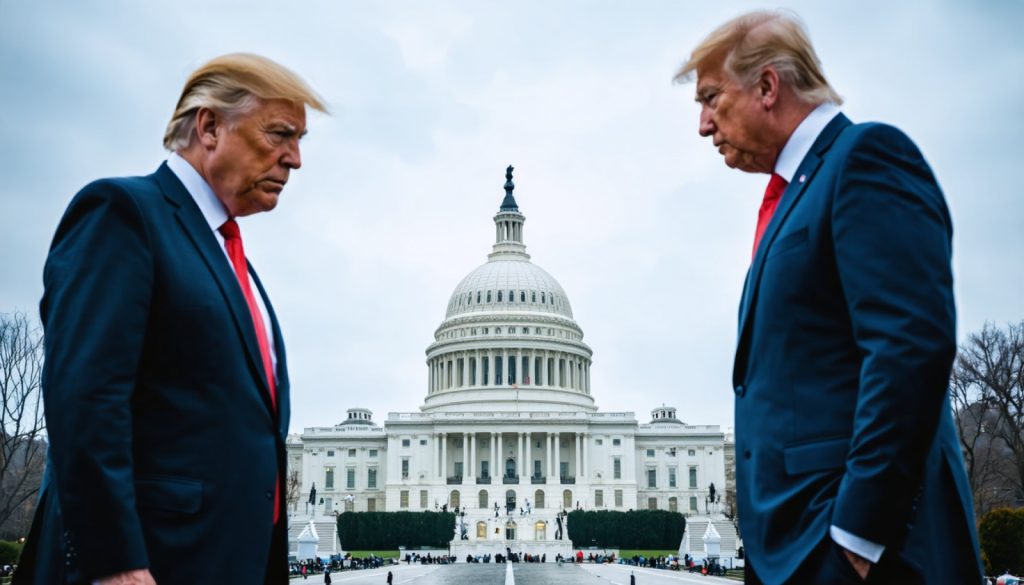
- Mark Zuckerberg has purchased a $23 million mansion in Washington, D.C., reflecting the growing influence of tech moguls near federal power centers.
- This acquisition is part of Zuckerberg’s array of luxurious residences and highlights the tech industry’s increasing involvement in American technology policy.
- The presence of billionaires like Zuckerberg, Bezos, and Thiel in D.C. represents a shift in how influence is manifested, beyond traditional political channels.
- The move occurs as the region’s economic landscape faces challenges, with federal employment restructuring causing insecurity for many residents.
- The convergence of tech leaders in Washington underscores a deeper connection between digital innovation and political power, shaping America’s future direction.
- This trend symbolizes not just luxury, but a new era where tech-policy synergies will play a critical role in steering the nation’s digital path.
A quiet storm brews in the leafy enclaves of Washington, D.C., as tech moguls recalibrate their stakes in the heart of federal power. The latest ripple comes from none other than Mark Zuckerberg, the enigmatic CEO of Meta, who stealthily secured a $23 million mansion nestled just a whisper away from the corridors of American power. This acquisition, revealed with newsworthy flourish, adds another luxurious chapter to Zuckerberg’s constellation of residences that already glimmers over Palo Alto, Lake Tahoe, and Hawaii.
The Woodland Normanstone mansion, a sprawling 15,000-square-foot edifice of red brick and modern farmhouse elegance, became the object of neighborhood curiosity, its brisk activity hinting at the convergence of Silicon Valley into the polity’s bosom. Flight trackers recorded Zuckerberg’s jet arrival, synthesizing gossip into fact as Meta confirmed the purchase, citing the need for the CEO’s enhanced presence on matters of American technology policy.
Detractors might bristle, positing that the purchase echoes an era of transactional rapport within the White House. As Zuckerberg joins the ranks of billionaires like Jeff Bezos and Peter Thiel, whose own Washington residences glimmer with opulence, the implication is profound: Influence isn’t merely exerted; it is literalized in bricks and mortar.
This influx of affluent titans into D.C. comes at a poignant moment. The region’s economic landscape, once buoyed by the steadiness of federal employment, now falters under the pressures of sweeping reorganization. With Elon Musk’s Department of Government Efficiency prompting tumultuous employment insecurity, many residents face an existential grip, wondering how to sustain themselves amidst a changing economy.
Yet, amid the shifting sands of policy and prosperity, this migration signifies more than symbolic gestures. It underscores a burgeoning truth: the corridors of power aren’t just in gilded government halls, but in the hands of those who pioneer the digital futures we all inhabit. Are these homes merely luxurious retreats or are they the new command centers for tech-policy synergies that will steer America’s digital destiny?
The takeaway is unequivocal. As technology and politics become increasingly entwined, the narrative isn’t just about opulent purchases; it’s about defining control over the future’s canvas. For now, as these mansions stand resolute amongst their storied peers, they encapsulate a transformative moment. They hint at a profound shift — an evolving dialogue between wealth, influence, and the very architecture of power in America.
Inside the High-Stakes Power Play: Tech Moguls’ Mansions in D.C.
As Mark Zuckerberg’s recent real estate purchase in Washington, D.C. stirs waves, there’s much more at stake than just a lavish home acquisition. This moment captures the intersection of technology, policy, and influence, signaling broader implications for the future of America’s socio-political landscape.
The Significance Behind Zuckerberg’s D.C. Mansion
1. Strategic Location: Zuckerberg’s multimillion-dollar residence is strategically placed near influential federal corridors, enabling easier access to policymaking hubs. Living closer to power could facilitate more frequent and impactful interactions with policymakers, potentially shaping technology regulations.
2. Trend of Tech Titans in D.C.: Zuckerberg isn’t alone; other Silicon Valley giants like Jeff Bezos and Peter Thiel have also secured residences in the nation’s capital. This indicates a growing trend of tech moguls recognizing the necessity to directly engage with political spheres to navigate and influence regulations impacting their businesses.
3. Impact on Local Economy: While the inflow of billionaires bolsters real estate values and local economy, it also exacerbates existing socio-economic divides, putting pressure on middle-class residents as property prices soar.
Navigating Tech-Policy Synergies
With Zuckerberg and peers increasingly planting roots in D.C., how these new power centers will influence tech policy remains unclear. However, the implications are profound:
– Policy Direct Influence: Direct access might enable tech leaders to lobby for more favorable laws and policies, potentially impacting everything from data privacy regulations to AI governance.
– Bridging Tech and Governance: The physical presence of these leaders in D.C. might foster collaboration between policymakers and the tech industry, potentially leading to more informed and effective policy formulations.
The Future Economic Landscape
1. Employment Impacts: The reshuffle initiated by governmental efficiency drives, like those led by Elon Musk, underscores a volatile economic future. Residents reliant on traditional federal employment now face uncertainty, prompting a necessary pivot towards tech-centric careers.
2. Industry Trends: With tech titans eyeing closer involvement in regulation, expect increased investments in government efficiency technologies and cybersecurity, industries poised for exponential growth.
3. Gentrification Concerns: As affluent individuals acquire prime real estate, concerns about gentrification and socio-economic displacement emerge, pressing policymakers to balance growth with equitable living standards.
Real-World Use Cases
– For Residents: Understanding these dynamics can inform proactive community engagement, advocating for equitable policies that consider the socioeconomic diversity of D.C. neighborhoods.
– For Businesses: Companies can capitalize on this shift by aligning with emerging regulatory frameworks, leveraging government incentives, and investing in innovation tailored to anticipated policy changes.
Conclusion: Actionable Recommendations
1. Stay Informed: Local communities and stakeholders should remain informed about policy changes and actively participate in public discussions to voice their concerns.
2. Adapt and Innovate: Businesses must adapt strategies to align with evolving regulations, potentially exploring new market opportunities within government efficiency technologies.
3. Foster Dialogue: Promote dialogue between residents, tech leaders, and policymakers to address socio-economic concerns while fostering collaborative innovations.
Additional Resources
– Explore more about evolving tech-policy dynamics at the [Meta Platform](https://www.meta.com).
– Discover insights on the local economy and industry trends at the [Washington D.C. Chamber of Commerce](https://www.dcchamber.org).
– For government policy updates and regulatory changes, visit [US Government](https://www.usa.gov).
By understanding the broader implications of these tech moguls’ moves, stakeholders can better navigate the evolving landscape, ensuring that the future they help sculpt is as equitable as it is innovative.



